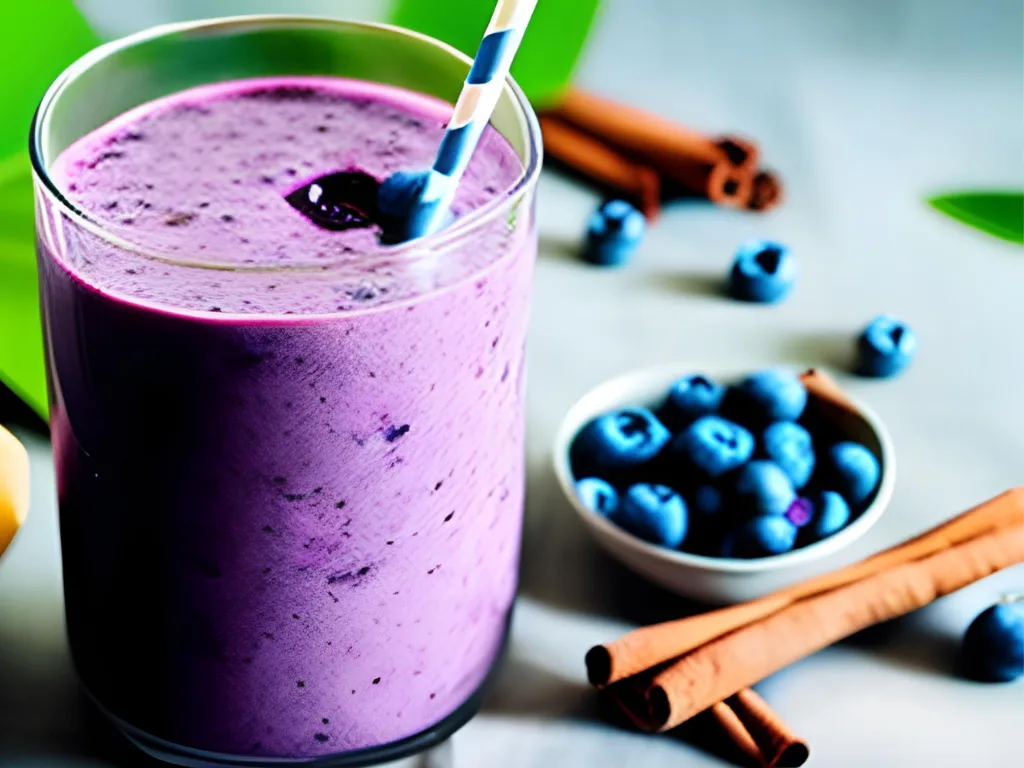Introducing the “Berry Power Protein Booster” smoothie, a delectable and nutritious blend designed to provide you with sustained energy throughout the day. This smoothie offers a balanced breakfast with a thoughtful combination of macro and micronutrients. It showcases the vibrant goodness of blueberries, known for their antioxidants and rich vitamin-mineral content. Rolled oats contribute fiber, promoting fullness and aiding digestion. Pasteurized egg whites serve as a high-quality protein source essential for muscle maintenance and repair.
Enhancing its nutritional profile, we include psyllium husk for digestive and heart health, while flaxseed oil adds omega-3 fatty acids vital for brain function and cardiovascular well-being.
Incorporating this smoothie into your morning routine ensures a well-rounded breakfast with the necessary macronutrients and micronutrients. Whether kick-starting your day or seeking a nutritious midday pick-me-up, the Berry Power Protein Boost smoothie delivers. It’s a convenient and delicious way to enjoy a satisfying meal while providing essential nutrients. Here’s to a nourishing start to your day!

Ingredients
- 250ml pasteurized egg whites
- 40g rolled oats
- 1 scoop of vanilla protein powder (e.g. whey protein isolate, plant protein powder)
- 100g frozen blueberries
- 1/2 teaspoon Ceylon cinnamon
- 3-5g psyllium husk (start low)
- 1 tablespoon flaxseed oil
- 1 cup unsweetened almond milk (or any other non-dairy milk of your choice)
- 1/2 teaspoon xanthan gum (optional)
Instructions
- Simply place in a blender, add the pasteurized egg whites, rolled oats, protein powder, frozen blueberries, cinnamon, psyllium husk, flaxseed oil, xanthan gum (if using), and almond milk.
- Blend the ingredients on high speed until smooth and well combined. If desired, add a few ice cubes to make the smoothie colder and thicker.
Nutritional profile
Estimated Macronutrient Breakdown:
- Protein: Approximately 50-60g (egg whites + protein powder)
- Carbohydrates: Approximately 50-60g
- Dietary Fiber: Approximately 15g
- Sugars: Approximately 10g
- Fats: Approximately 15-20g
Estimated Micronutrients:
- Vitamins and Minerals: The smoothie provides a variety of vitamins and minerals such as B vitamins, vitamin C, vitamin E, calcium, magnesium, and more, mainly from ingredients like egg whites, blueberries, and almond milk.
Estimated Calories: The total caloric content of the smoothie is estimated to be around 500-600 calories.
Taste the smoothie and adjust the sweetness if necessary. You can add a small amount of honey or a natural sweetener if desired.
Once the desired consistency and taste are achieved, pour the smoothie into a glass. Optionally, you can garnish the smoothie with a sprinkle of cinnamon on top. Serve immediately and enjoy your heart-healthy smoothie!
Benefits of rolled oats
Rolled oats, a popular whole grain option, provide numerous health benefits. They are an excellent source of dietary fiber, aiding in digestion, promoting a feeling of fullness, and helping to stabilize blood sugar levels. Rolled oats also contain a good balance of complex carbohydrates and protein, making them a nutritious energy source. Furthermore, they are rich in essential nutrients such as vitamins, minerals, and antioxidants, contributing to heart health, improved immunity, and potential reductions in cholesterol levels.
Benefits of Flaxseed Oil
Flaxseed oil is rich in omega-3 fatty acids, specifically alpha-linolenic acid (ALA). Omega-3 fatty acids are known to support heart health by reducing inflammation, lowering blood pressure, and improving cholesterol levels. Flaxseed oil may also have potential benefits for skin health, brain function, and joint health.
Benefits of Psyllium Husk
Psyllium husk is a soluble fiber that can aid in digestion and promote heart health. It helps regulate bowel movements and can be beneficial for individuals with constipation or irritable bowel syndrome (IBS). Psyllium husk can also help lower cholesterol levels by binding to bile acids and reducing their reabsorption, thus supporting cardiovascular health.
Benefits of Ceylon Cinnamon
Ceylon cinnamon, also known as “true” cinnamon, offers several health benefits due to its unique composition of compounds. It has been linked to potential improvements in blood sugar management, as it may enhance insulin sensitivity and regulate glucose levels. Additionally, Ceylon cinnamon possesses anti-inflammatory and antioxidant properties, which could contribute to overall well-being and potentially support heart health. Find out more on Ceylon Cinnamon here.
Adding xanthan gum
Xanthan gum is a natural thickening agent that can enhance the texture and consistency of smoothies. It helps create a creamy and thick texture, similar to what you might find in commercial smoothies. However, keep in mind that xanthan gum is optional, and the smoothie will still taste great without it.
Enjoy a powerful protein-packed treat that will keep you full and your heart healthy with the complex carbohydrates from rolled oats!


